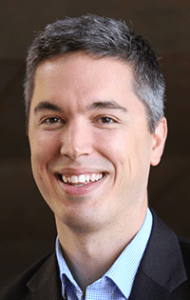Published: Monday, July 22, 2019, 12:00 p.m. U.S. Eastern Time
Media Contact: Ann Klinck, 301.634.7342, press@ashg.org
Geneticist to Receive Award at ASHG 2019 Annual Meeting

The American Society of Human Genetics (ASHG) has named Stephen Montgomery, PhD, as the recipient of the 2019 Early-Career Award. Dr. Montgomery is an Associate Professor in the Departments of Genetics, Pathology, and Computer Science at Stanford University School of Medicine.
This award recognizes the contributions of genetics and genomics scientists in the first ten years of their careers as independent investigators. ASHG will present the award, which will include a plaque and $10,000 prize, on Tuesday, October 15, during the organization’s 69th Annual Meeting in Houston, Texas
“Stephen is a phenomenal researcher, mentor, and contributor to human genetics – I can’t think of an individual more deserving of this honor,” said Michael Snyder, PhD, Director of the Center for Genomics and Personalized Medicine at Stanford University, in his nomination letter.
Dr. Montgomery’s work has focused on gene regulation and expression and its intersection with human genetics. He gained tenure in 2018 from Stanford, after joining faculty as an assistant professor in 2011. His lab has collaborated with many teams and consortia to advance the use of functional genomics to interpret the mechanisms of genetic disease, and has contributed to projects such as SardiNIA, GTEx, and the UDN.
Dr. Montgomery has been developing approaches to analyze rare genetic variants using functional genomics. Recently, Dr. Montgomery reported on use of blood transcriptome and genetic data to identify rare variants in undiagnosed genetic diseases. His efforts are leading to new translational options for individuals with rare genetic diseases.
Dr. Montgomery has been developing approaches to analyze rare genetic variants using functional genomics. Recently, Dr. Montgomery reported on use of blood transcriptome and genetic data to identify rare variants in undiagnosed genetic diseases. His efforts are leading to new translational options for individuals with rare genetic diseases.
He is now one of the principal investigators for the NIH Common Fund’s MoTrPAC, which is working to identify genetic variants that function differently when people exercise. This research will inform the development of new therapeutic approaches and expand the field’s knowledge of molecular impacts of exercise.
In addition to leading impactful research, Dr. Montgomery has been an influential mentor to the graduate students and postdoctoral researchers in his lab. Despite being early in his career, he has served on 26 thesis advisor or defense committees and graduated 6 students from his laboratory. Previous graduate students and postdoctoral researchers from Dr. Montgomery’s lab have moved onto institutions such as Harvard University, UCLA, and Vertex Pharmaceuticals. Several have also received prestigious awards and fellowships including the ASHG Cotterman Award, a Banting Fellowship, and the Chinese Thousand Talents Program.
A member of ASHG since 2008, Dr. Montgomery has achieved great things in the field. He has published more than 90 articles in peer-reviewed journals, has been funded within several NIH programs, and has been invited to speak at international conferences about his genetic research.
About the American Society of Human Genetics (ASHG)
Founded in 1948, the American Society of Human Genetics is the primary professional membership organization for human genetics specialists worldwide. Its nearly 8,000 members include researchers, academicians, clinicians, laboratory practice professionals, genetic counselors, nurses, and others with an interest in human genetics. The Society serves scientists, health professionals, and the public by providing forums to: (1) share research results through the ASHG Annual Meeting and in The American Journal of Human Genetics; (2) advance genetic research by advocating for research support; (3) educate current and future genetics professionals, health care providers, advocates, policymakers, educators, students, and the public about all aspects of human genetics; and (4) promote genetic services and support responsible social and scientific policies. For more information, visit: http://www.ashg.org.
6120 Executive Blvd, Suite 500 | Rockville, MD 20852 | 301.634.7300 | society@ashg.org | www.ashg.org
Connect with ASHG on Twitter (@GeneticsSociety) | Facebook | LinkedIn
